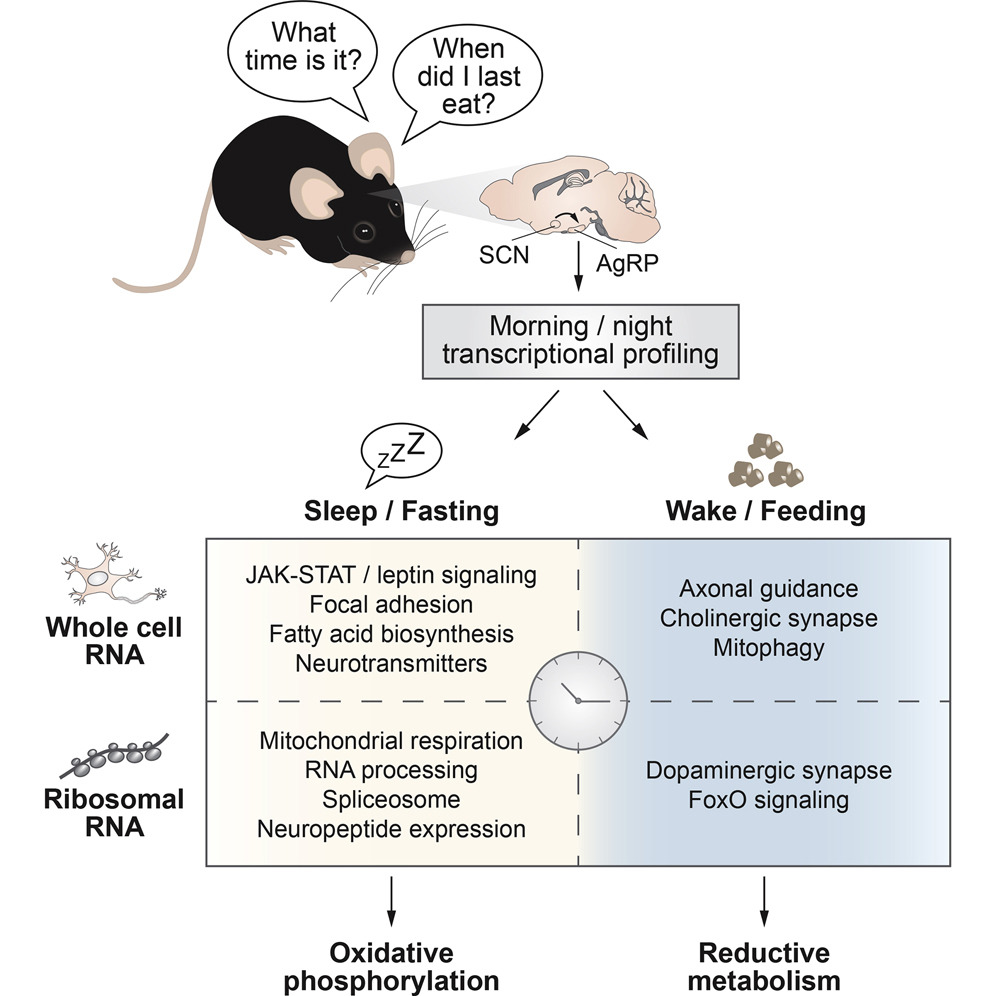April 11, 2019 | Jola Glotzer
Is it time to eat?
CBC Spark Awardee, Joseph Bass, NU, identifies a subset of neurons in the hypothalamus that coordinate circadian rhythm-dependent sense of hunger
Congratulations to Joseph Bass, NU, and his collaborators who have recently published in Cell Metabolism a paper titled “Transcriptional Basis for Rhythmic Control of Hunger and Metabolism within the AgRP Neuron.” In the article, the authors show that a specific group of neurons within the mouse hypothalamus region — called AgRP neurons — as Bass puts it, “…are ‘central command’ for hunger, […] and integrate a variety of signals before ‘broadcasting’ hunger or satiation to the rest of the brain.” If circadian rhythm transcription factors are turned off in AgRP neurons, the mice, which typically eat at night, lose hunger control and begin eating during the daytime. These findings suggest a way to investigate if and how AgRP neurons contribute to the body weight control, both in health and disease. The publication is partially attributed to the CBC Spark Award (2011) that Bass received together with Nissim Hay, UIC, Graeme Bell and Louis Philipson, UChicago. Bass was also a co-recipient of an earlier CBC Catalyst Award (2007).
The complex communications that help cells synchronize movement
Northwestern Medicine News | by Will Doss | March 21, 2019

Joseph Bass, MD, PhD, the Charles F. Kettering Professor of Medicine in the Division of Endocrinology and director of the Center for Diabetes and Metabolism, was the senior author of the study that found how circadian rhythm coordinates hunger. (Source: Northwestern Medicine News)
Northwestern Medicine scientists have explained how circadian rhythm regulates hunger, a long-suspected connection that was confirmed by the study published in Cell Metabolism.
The scientists traced the regulation to a group of neurons in the hypothalamus, a brain region that coordinates autonomic functions like body temperature, thirst and hunger.
“We identified one of the places in the brain where the drive for hunger is coordinated when you’re awake and when you’re asleep,” said Joseph Bass, MD, PhD, the Charles F. Kettering Professor of Medicine in the Division of Endocrinology, director of the Center for Diabetes and Metabolism and senior author of the study. “It’s sort of like a relay station.”
Mammalian circadian rhythm is regulated by a complex gene transcription feedback loop, a Nobel-prize winning discovery that evolved from initial findings of Northwestern studies published in the 2000s. Specialized cells detect light or darkness, and through gene transcription set a day and night cycle that influences a variety of functions. While earlier studies had hinted at how circadian rhythm regulated hunger, the exact molecular pathway was unknown.
“We didn’t know much about how that timing process influenced our appetite or how the body metabolizes what we eat,” said Bass, who is also a member of the Robert H. Lurie Comprehensive Cancer Center of Northwestern University.

Graphical abstract. (Source: Cell Metabolism)
In the current study, Bass and his colleagues zeroed in on a population of neurons in the hypothalamus, called AgRP neurons. These neurons are “central command” for hunger, Bass said, and integrate a variety of signals before “broadcasting” hunger or satiation to the rest of the brain.
Jonathan Cedernaes, PhD, a postdoctoral fellow in Bass’ laboratory and first author of the study, turned off clock transcription in only the AgRP neurons of mice, finding it disrupted the mice’s feeding patterns.
“Normally, a mouse eats about 80 percent of its food at night, when it’s awake,” Cedernaes said. “Here, we saw a significant increase in the amount of food they ate during the day, when they normally would be sleeping.”
This demonstrated that clock transcription is an important input into AgRP cells; without it, the ability to regulate hunger is lost. Further analysis also revealed substantial overlap between genes in the AgRP neurons that regulate appetite and genes that control mitochondrial function in cells, an important finding according to Bass.
“The clock genes have some fundamental role to regulate hunger, and it’s doing that through the control of genes that are involved in providing energy to neurons,” Bass said.
Learning more about how these networks operate is crucial to better understanding how body weight is controlled, according to Bass.
“Why do people who eat the same amount of calories at different times of day have differences in their weight gain?” Bass said. “The converse is also true; how can we learn about how the system is wired so that when we try to lose weight, we can optimize the system?”
Other Feinberg co-authors include Wenyu Huang, MD, PhD, assistant professor of Medicine in the Division of Endocrinology, and Kathryn Ramsey, PhD, research assistant professor of Medicine in the Division of Endocrinology.
The study was supported by the National Institute of Diabetes and Digestive and Kidney Diseases (NIDDK) grants R01DK090625, R01DK113011, R01DK100814, and P01DK049210; the National Institute on Aging grant P01AG011412; the National Institute of Mental Health grant R01MH110556; the Chicago Biomedical Consortium S-007; the University of Chicago Diabetes Research and Training Center grant P60DK020595; the NIDDK award K01DK105137-02; the Swedish Research Council grant 2014-6888; and the Swedish Society for Medical Research.
Publication attributed to the CBC funding*:
Cedernaes J, Huang W, Ramsey KM, Waldeck N, Cheng L, Marcheva B, Omura C, Kobayashi Y, Peek CB, Levine DC, Dhir R, Awatramani R, Bradfield CA, Wang XA, Takahashi JS, Mokadem M, Ahima RS, Bass J. Transcriptional Basis for Rhythmic Control of Hunger and Metabolism within the AgRP Neuron. Cell Metab. 2019 Feb 18. [Epub ahead of print] (PubMed)
Source:
Adapted (with modifications) from the Northwestern Medicine News, by Will Doss, published on March 21, 2019.
Featured CBC Community member(s):
Joseph Bass, NU
- *CBC Spark Award (2011):
▸ Leptin Peptide in Diabetes: From Mechanism to Therapeutics
PIs: Joseph Bass (NU), Graeme Bell (UChicago) and Nissim Hay (UIC) - CBC Catalyst Award (2007):
▸ Chicago Consortium in Diabetes and Obesity Genetics
PIs: Joseph Bass (NU), Graeme Bell (UChicago), Louis Philipson (UChicago) and Nissim Hay (UIC)
Related:
November 8, 2018
▸ NF-kappa beta, inflammation and sleep disorders
CBC Spark Award recipient, Joseph Bass, NU, discovers a genetic link between the causes of inflammation and the circadian clock control
October 31, 2016
▸ Muscles Have Circadian Clocks that Control Exercise Response
The time of day determines a muscle’s energy efficiency and metabolic response
November 16, 2015
▸ Circadian Clock Controls Insulin and Blood Sugar in Pancreas
Map of thousands of genes suggests new therapeutic targets for diabetes
